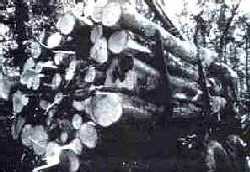Star cross in Nigeria
 one of the richest hordes of tropical rainforests in all of western Africa is in dire straits. The government of Nigeria's Cross River state is planning to grant logging concessions in five forest reserves of the state to a Lagos-based Chinese metal concern, the Western Metal Product Company ( wempco ).
one of the richest hordes of tropical rainforests in all of western Africa is in dire straits. The government of Nigeria's Cross River state is planning to grant logging concessions in five forest reserves of the state to a Lagos-based Chinese metal concern, the Western Metal Product Company ( wempco ).
The main affected reserves of the state, which is located in the southern part of the country, include 199.65 sq km in Cross River South Forest Reserve, 113.32 sq km in the Afi River Forest Reserve and 129.5 sq km in Cross River North Forest Reserve. The total area affected stands at 541.3 sq km, which environmentalists say contains approximately 1,200 plant species, 100 of them being endemic to Nigeria.Real on reel
While local communities have raised a hue and cry over the havoc that the company's activities are going to play with the livelihoods of the region's inhabitants, non-governmental organisations ( ngos) have stepped into the fray in a decisive manner. The chief grouse of the ngos - among which are groups like the Civil Liberties Organisation or clo (a human rights group), the Nigerian Conservation Foundation and the ngo -Coalition for Environment in Cross River State - is that the concessions would endanger the forest reserves which constitute watersheds to the river Cross, which serves more than three million people living in 300 communities in Nigeria's four southern states.
The clo's condemnation is cate-gorical: " wempco's moves in Cross River state, if not stopped, could result in destruction of prime forests. Since the company has no known acceptable reforestation culture, loss of biodi-versity, severe erosion by opening wide tracks of earth roads in forests, logging with bulldozers and pollution arising from the factory situated upstream at Bakomo, would affect the Cross River state." The ngos believe that even if wempco is eventually allowed any concession, it should be forced to follow some scientific and stringent guidelines. A checklist of suggestions includes the following:
• conducting environmental impact assessment ( eia ) of all logging concessions using independent agents whose qualifications will be vetted and approved by all stakeholders in forest areas, particularly the local communities;
• logging timber in a sustainable and scientific manner;
• making efforts to maintain the limit of the concession;
• involving local communities in development activities affecting their lands and resources
• replanting destroyed trees
• avoiding indiscriminate opening-up of roads inside forests.
The clo , in the middle of last year, had dragged the state government and wempco to High Court over the issue. The court decided in favour of the ngo , asking the defendants to stay action pending the substantive suit, still awai-ted. The ngos have resor-ted to various other actions to highlight the issue; they have organised environmental fora where government officials and wempco staff have been invited to state their positions; they have also distributed handbills all over the country and put in advertorials in national dailies.
In an effort to redeem its image, wempco , has gone on a promise-making spree to local communities, assuring them of the establishment of industries and provision of social amenities. Some traditional rulers of the area have already been enticed by the company into supporting it. wempco , which claims to have carried out an eia in the region, has also assured that it will confine its logging operations to the area where it has been granted concessions, will adhere to forest regulations, will not damage forest produce and will fell only mature and the old trees. Moreover, the company's wood factory will produce only veneer and plywood through a dry process with no toxic effluents or emissions. "The factory operations are anticipated to be a closed system with little or no polluting effluents," the company claimed.
The ngos have, however, criticised the company's eia , saying that the it has been undertaken only for one of the affected forest reserves. Also, it did not conform to the provisions of the Nigerian eia decree of 1992, which requires that an eia must show the effects of a project upon neighbouring states too.
